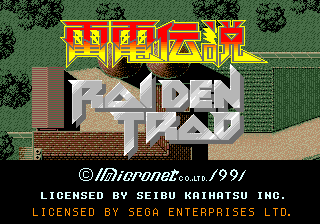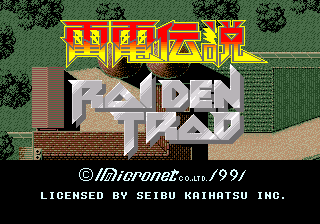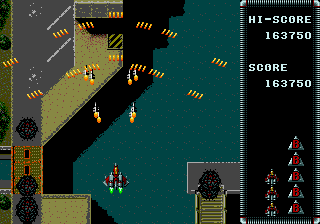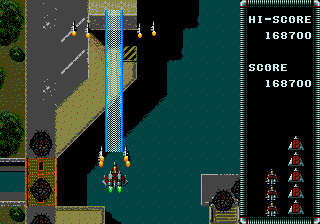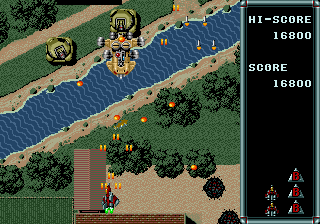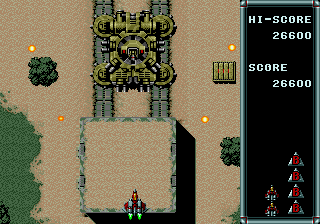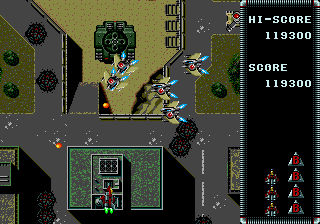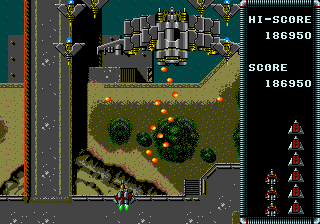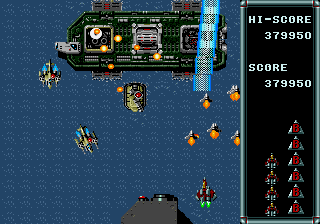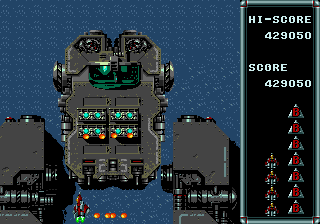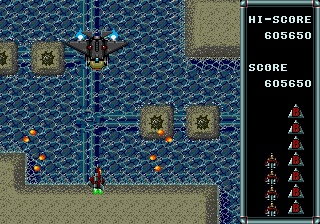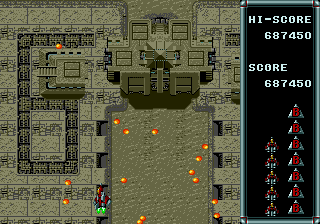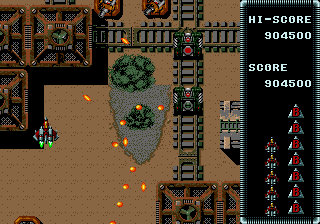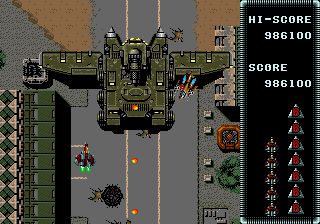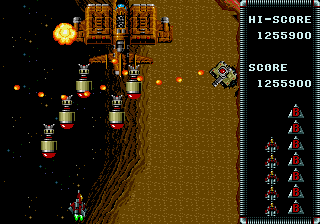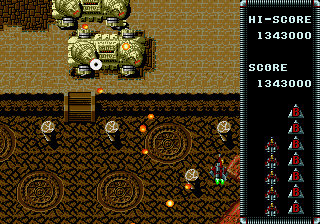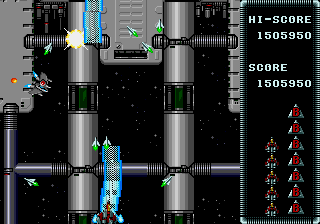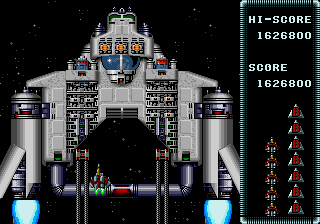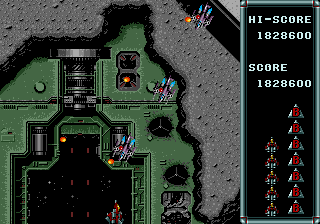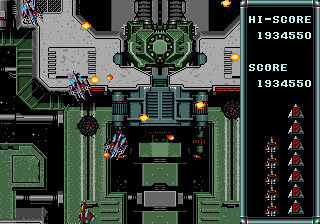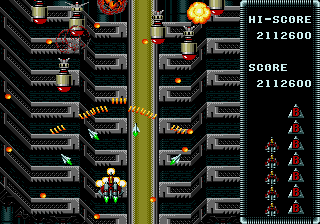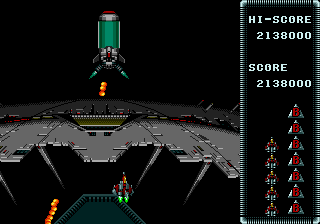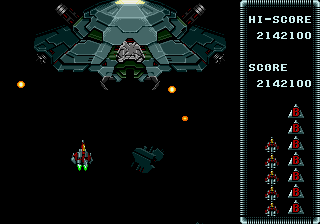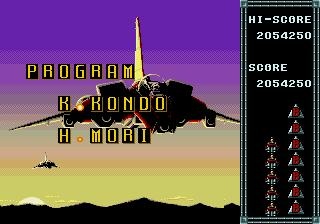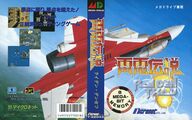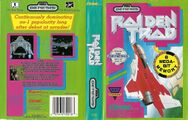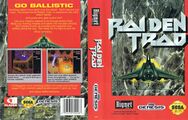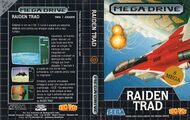Difference between revisions of "Raiden Trad"
From Sega Retro
m (Text replacement - "==Technical information== ===" to "==Technical information== {{mainArticle|{{PAGENAME}}/Technical information}} ===") |
|||
| Line 235: | Line 235: | ||
==Technical information== | ==Technical information== | ||
{{mainArticle|{{PAGENAME}}/Technical information}} | {{mainArticle|{{PAGENAME}}/Technical information}} | ||
| − | |||
| − | |||
| − | |||
| − | |||
==References== | ==References== | ||
Revision as of 14:21, 22 April 2023
| |||||||||||||||||||||||||
| Raiden Trad | |||||||||||||||||||||||||
|---|---|---|---|---|---|---|---|---|---|---|---|---|---|---|---|---|---|---|---|---|---|---|---|---|---|
| System(s): Sega Mega Drive | |||||||||||||||||||||||||
| Publisher: Micronet (JP, US) Bignet USA (US rerelease) Tec Toy (BR) | |||||||||||||||||||||||||
| Developer: Seibu Kaihatsu, Beyond Interactive[1] | |||||||||||||||||||||||||
| Distributor: Bignet USA (US) | |||||||||||||||||||||||||
| Licensor: Seibu Kaihatsu | |||||||||||||||||||||||||
| Original system(s): Arcade boards | |||||||||||||||||||||||||
| Genre: Shooting[2][3][4] | |||||||||||||||||||||||||
| Number of players: 1 | |||||||||||||||||||||||||
| |||||||||||||||||||||||||
|
Raiden Trad, known as Raiden Densetsu (雷電伝説) in Japan, is a 1991 shoot-'em-up published by Micronet for the Sega Mega Drive exclusively in the US and Japan. It is an expanded port of Seibu Kaihatsu's 1990 arcade shoot-'em-up Raiden and the only game in their Raiden series of shoot-'em-ups on a Sega console.
A European release was planned by Ubisoft[9] but it did not materialise.
Contents
Story
In the year 2090, a species of alien lifeforms known as the Crystals has invaded Earth. The Crystals took control over most of Earth's military hardware to use in the invasion. In response, the world organization known as Vanquish Crystal Defense (VCD) develops the Fighting Thunder attack craft, a cutting-edge weapon based on Crystal technology. To survive against the invaders and fight back, VCD deploys Fighting Thunder as the only hope for humanity.
Gameplay
The game is a vertically scrolling shoot-'em-up. The player's aircraft is moved in any direction using the D-Pad. It shoots with ![]() or
or ![]() . By default, holding down the fire button shoots repeatedly but with a delay between each shot. If rapid-fire is enabled in the options,
. By default, holding down the fire button shoots repeatedly but with a delay between each shot. If rapid-fire is enabled in the options, ![]() fires three shots in a row before a short delay (while
fires three shots in a row before a short delay (while ![]() remains unchanged). The ship's primary weapon can be either the Wide Shot, which covers a wider area, or the Laser, a narrow but more powerful shot. The ship can also equip a subweapon, which is fired simultaneously with the primary weapon, by collecting a power-up. The subweapon is either shooting Nuclear Missiles, which deal high damage, or Homing Missiles, which are weaker but seek targets automatically. Collecting the power-up for the currently equipped weapon upgrades it, while collecting the power-up for the other weapon changes to it while keeping the weapon level the same. The ship also has a cache of bombs, which are deployed with
remains unchanged). The ship's primary weapon can be either the Wide Shot, which covers a wider area, or the Laser, a narrow but more powerful shot. The ship can also equip a subweapon, which is fired simultaneously with the primary weapon, by collecting a power-up. The subweapon is either shooting Nuclear Missiles, which deal high damage, or Homing Missiles, which are weaker but seek targets automatically. Collecting the power-up for the currently equipped weapon upgrades it, while collecting the power-up for the other weapon changes to it while keeping the weapon level the same. The ship also has a cache of bombs, which are deployed with ![]() . Bombs are limited in supply and do large area damage and neutralize enemy projectiles.
. Bombs are limited in supply and do large area damage and neutralize enemy projectiles.
The ship is destroyed if it collides with an enemy or takes enemy fire. It respawns at a checkpoint with the base weapon, no subweapon, and the initial supply of three bombs if the player has lives left. The game ends if the player runs out of lives, but it can be continued as long as the player has continues remaining. The player can choose from three difficulty levels (Easy, Normal, and Hard) and set the starting number of lives in the options before starting the game.
Weapons
| Wide Shot | |
|---|---|
| The initially equipped weapon. It starts as two parallel streams of bullets but grows into a large conical spreadshot as it is upgraded. | |
| Laser | |
| A narrow but more powerful shot. It grows in width as it is upgraded. |
Items
Items are released by destroying enemies or objects such as crates.
The weapon and subweapon power-ups cycle between the two choices. Collecting the item for a weapon that is already at maximum level awards 5,000 bonus points.
| Laser | |
|---|---|
| Changes the primary weapon to the Laser or upgrades it, up to 8 levels, if already equipped. | |
| Wide Shot | |
| Changes the primary weapon to the Wide Shot or upgrades it, up to 8 levels, if already equipped. | |
| Nuclear Missile | |
| Changes the subweapon to Nuclear Missiles or upgrades it, up to 4 levels, if already equipped. | |
| Homing Missile | |
| Changes the subweapon to Homing Missiles or upgrades it, up to 4 levels, if already equipped. | |
| Power | |
| Upgrades the current weapon to its maximum level. Awards 10,000 bonus points if the weapon is already at maximum level. | |
| Bomb | |
| Adds another bomb to the player's stock, up to a maximum of 7. The player receives bonus points at the end of the stage for the number of bombs remaining. Awards 5,000 bonus points if the player already has the maximum number of bombs. | |
| Decoration | |
| Awards 500 bonus points to the player. The player receives additional bonus points at the end of the stage for the number of Decorations collected on the current life. | |
| Miclus | |
| Awards 5,000 bonus points to the player. This item sometimes appears in place of a Decoration. Miclus is the mascot of Seibu Kaihatsu. | |
| Fairy | |
| Awards 10,000 bonus points to the player. | |
| 1-Up | |
| Gives the player an extra life. |
Stages
| Countryside | |
|---|---|
| City | |
| Ocean | |
| Ruins | |
| Wasteland | |
| Floating Continent | |
| Space Station | |
| Enemy Final Base | |
| Special Stage | |
| This stage is a bonus stage unavailable in any other versions of the game that is played after the credits. |
Versions
Though other third parties have ported it to various other systems, Mega Drive version was ported by original developer. When played on Normal difficulty level, the game is the closest port of the 16-bit era. The Super NES content has cut content, and the PC Engine version has more colorful graphics but slight changes in stage layout and scrolling speed. Exclusive to the Mega Drive version is a ninth stage simply called "special stage", accessed after clearing the game once. This stage has new graphics and a new boss.
This is a multi-regional release. The title changes depending on the systems country setting.
Localised names
| Language | Localised Name | English Translation |
|---|---|---|
| English (US) | Raiden Trad | Raiden Trad |
| Japanese | 雷電伝説 | Raiden Densetsu |
Production credits
- Program: K.KONDO, H.MORI
- Graphic: M.KATO, BEYOND, TOSHI, B.WADA
- Music: AKIRA
Magazine articles
- Main article: Raiden Trad/Magazine articles.
Promotional material
- Main article: Raiden Trad/Promotional material.
Physical scans
| 69 | |
|---|---|
| Based on 30 reviews | |
Technical information
- Main article: Raiden Trad/Technical information.
References
NEC Retro has more information related to Raiden
|
NEC Retro has more information related to Super Raiden
|
- ↑ http://gdri.smspower.org/wiki/index.php/Beyond_Interactive
- ↑ File:RaidenTrad MD JP Box.jpg
- ↑ File:RaidenTrad MD US Box.jpg
- ↑ 4.0 4.1 https://sega.jp/history/hard/megadrive/software_l.html (Wayback Machine: 2020-07-02 23:21)
- ↑ File:EGM US BuyersGuide 1992.pdf, page 15
- ↑ https://groups.google.com/g/rec.games.video/c/CPV6hrGp_d4/m/9EpVhNiDfEcJ
- ↑ Electronic Gaming Retail News, "September 1991" (US; 1991-0x-xx), page 27
- ↑ 8.0 8.1 Supergame, "Julho 1992" (BR; 1992-07-xx), page 33
- ↑ Sega Force, "January 1992" (UK; 1991-12-12), page 10
- ↑ File:Raiden Trad MD credits.pdf
- ↑ 1700 igr dlya Sega, "" (RU; 2001-xx-xx), page 184
- ↑ Aktueller Software Markt, "November 1991" (DE; 1991-10-11), page 150
- ↑ Beep! MegaDrive, "July 1991" (JP; 1991-06-08), page 32
- ↑ Consoles +, "Septembre 1991" (FR; 1991-09-04), page 73
- ↑ Console XS, "June/July 1992" (UK; 1992-04-23), page 133
- ↑ Electronic Gaming Monthly, "October 1991" (US; 1991-xx-xx), page 20
- ↑ Mean Machines: The Essential Sega Guide, "" (UK; 1993-11-18), page 81
- ↑ Famitsu, "1991-07-26" (JP; 1991-07-12), page 1
- ↑ GamePro, "November 1991" (US; 1991-xx-xx), page 55
- ↑ Génération 4, "Janvier 1992" (FR; 199x-xx-xx), page 142
- ↑ Game Zone, "February 1992" (UK; 1992-01-24), page 42
- ↑ Hippon Super, "August 1991" (JP; 1991-07-04), page 87
- ↑ Joystick, "Septembre 1991" (FR; 1991-0x-xx), page 195
- ↑ Sega Mega Drive Advanced Gaming, "September 1992" (UK; 1992-xx-xx), page 81
- ↑ Sega Mega Drive Advanced Gaming, "January 1993" (UK; 199x-xx-xx), page 93
- ↑ Mega Drive Fan, "October 1991" (JP; 1991-09-xx), page 107
- ↑ MegaTech, "Xmas 1991" (UK; 1991-12-06), page 79
- ↑ Mean Machines, "December 1991" (UK; 1991-11-28), page 134
- ↑ Mean Machines Sega, "October 1992" (UK; 1992-09-xx), page 140
- ↑ Player One, "Décembre 1991" (FR; 1991-xx-xx), page 106
- ↑ Power Play, "11/91" (DE; 1991-10-11), page 153
- ↑ Sega Power, "October 1991" (UK; 1991-09-05), page 54
- ↑ Sega Power, "November 1991" (UK; 1991-10-04), page 23
- ↑ Sega Pro, "April 1993" (UK; 1993-03-11), page 66
- ↑ Sega Pro, "December 1991" (UK; 1991-11-21), page 68
- ↑ Sega Pro, "March 1992" (UK; 1992-02-20), page 33
- ↑ Sega Saturn Magazine, "September 1995" (JP; 1995-08-08), page 86
- ↑ Tricks 16 bit, "Tricks Sega Gold 800 igr" (RU; 1998-03-20), page 140
- ↑ VideoGames & Computer Entertainment, "November 1991" (US; 1991-1x-xx), page 49
| Raiden Trad | |
|---|---|
|
Main page | Comparisons | Hidden content | Magazine articles | Reception | Promotional material | Region coding | Technical information | Bootlegs | |
